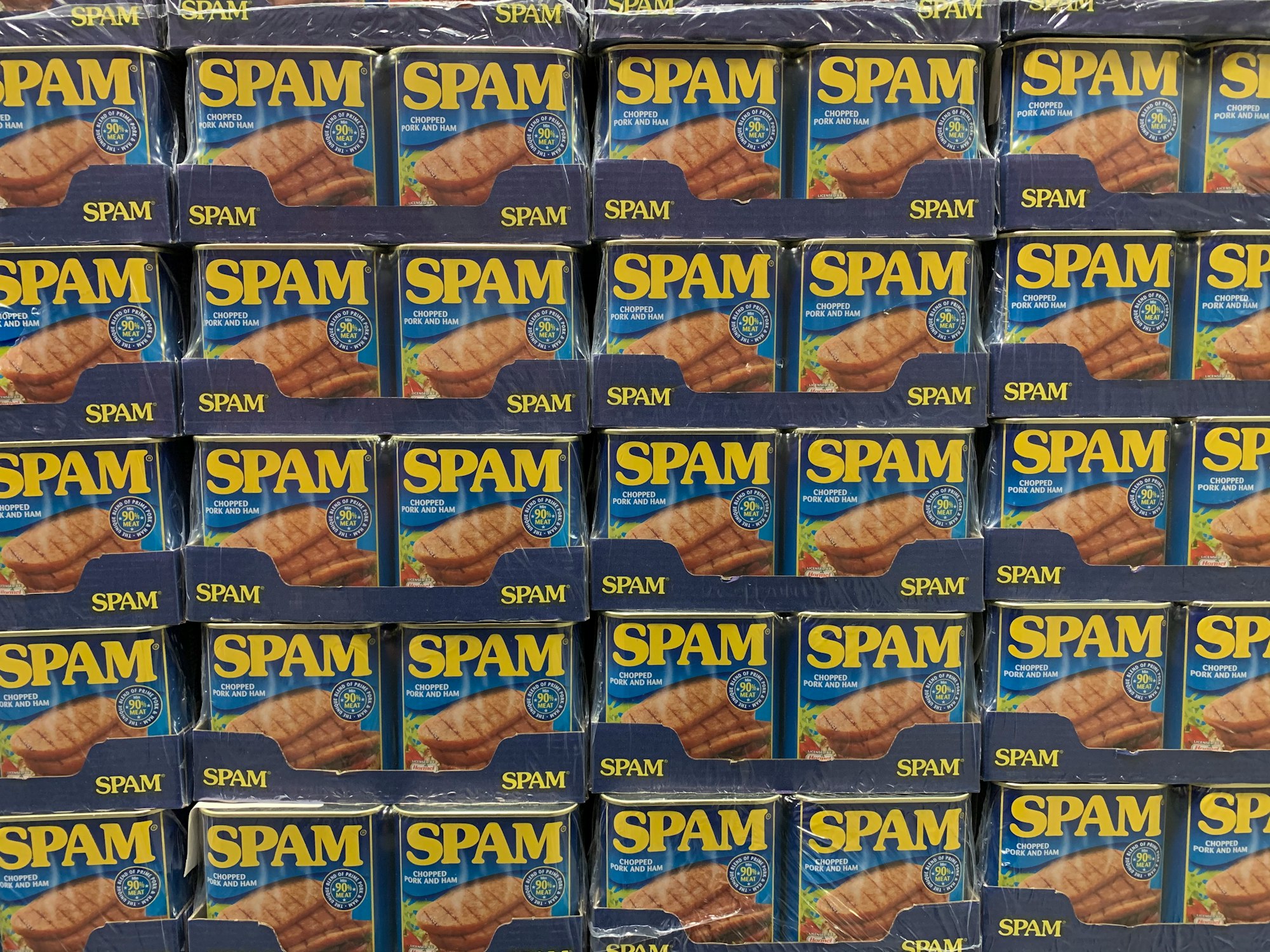When it comes to our furry friends, it is crucial to be mindful of their diet. Spam, a popular canned meat product, may appeal to some dog owners as a quick and convenient treat option. Before sharing this processed meat with your furry friend, it is crucial to understand the potential risks involved.
Spam is a type of canned meat product that consists of pork, ham, salt, water, sugar, and various other additives. While it may be safe for human consumption in moderation, it is important to question whether it is suitable for dogs.

Key takeaway:
- Spam is not recommended for dogs. While dogs can technically eat spam, it is not a suitable or healthy food for them. It contains high amounts of sodium, preservatives, and additives, which can be harmful to dogs.
- Potential risks of dogs eating spam: Dogs consuming spam may experience digestive issues, such as vomiting or diarrhea, due to its high fat and sodium content. It can also lead to obesity and other health problems over time.
- Alternatives to spam for dogs: Instead of feeding spam to dogs, opt for healthier alternatives such as lean meats, cooked vegetables, or commercial dog food that is specifically formulated for their nutritional needs.

Ensure a Healthy Diet for Your Dog with the Fi Dog Collar
Keeping your dog's health a top priority means being mindful of what you feed them. Instead of offering processed foods like Spam, which contain high levels of sodium, fat, and preservatives that could harm your dog, focus on providing a balanced diet of lean meats, vegetables, and dog-specific foods.
In addition to a healthy diet, ensure your dog's well-being by tracking their activity levels with the Fi Dog Collar. This smart collar monitors your dog's daily exercise, helping you maintain their fitness and prevent obesity-related health issues. With the Fi Dog Collar, you can make informed decisions about your dog's health while enjoying peace of mind knowing they're safe and active.
Invest in the Fi Dog Collar today and take a proactive step toward supporting your furry friend's long, healthy life.
Can Dogs Eat Spam?
Dogs should not eat spam. Spam is a processed meat product that containshigh levels ofsalt, fat, and preservatives. Feeding spam to dogs can lead to health issues.
The high salt content in spam can be harmful to dogs. Consuming excessive amounts of salt can lead to dehydration, imbalances in electrolytes, and kidney problems. Dogs have different nutritional needs than humans and cannot handle large amounts of salt.
The high fat content in spam can cause digestive upset in dogs. Dogs have a sensitive digestive system, and consumingfatty foods canresult inpainful and potentially life-threatening pancreatitis.
Moreover, spam contains additives that are not suitable for dogs. These additives can cause allergic reactions or digestive disturbances.
If you are searching for alternative protein sources for your dog, opt for lean meats that are specifically desgined for canine consumption. Cook them thoroughly and avoid using harmful seasonings or additives.
What is Spam?
Spam is a widely known and popular canned meat product introduced by Hormel Foods Corporation in 1937. It is typically made from pork shoulder and ham, combined with salt, sugar, water, and sodium nitrite. To ensure food safety, it undergoes a cooking process under high pressure.
Spam boasts an extended shelf life, making it convenient for consumption straight from the can or incorporation into various recipes. It is essential to note that due to its high sodium and fat content, it may not be the healthiest option. Therefore, it is advisable to consume Spam in moderation as part of a well-balanced diet.
Is Spam Safe for Dogs to Eat?
When feeding dogs, their safety and well-being should be considered. To determine if spam is safe for dogs, consider the following factors:
- Ingredients: Spam is primarily made from pork shoulder and ham. But it also contains salt and preservatives. While small amounts of plain, cooked pork can be safe for dogs, the high sodium content in spam can be a concern. Excessive salt intake can lead to dehydration and other health issues, especially for dogs with kidney or heart problems.
- Sodium content: Spam is known for its high sodium content. Dogs have different sodium requirements than humans, and excessive sodium intake can be harmful to their health. Dogs should consume no more than 100 mg of sodium per day per 10 pounds of body weight. Spam contains about 790 mg of sodium per 100 grams, making it a very high-sodium food choice for dogs.
- Processed meat: Spam is a processed meat product, and consuming processed meats has been linked to health issues in humans. While there is limited research on the effects of processed meats on dogs, it is generally recommended to feed them fresh and unprocessed foods for their overall health and well-being.
Considering these factors, it is best to avoid feeding spam to dogs. Instead, choose lean, unprocessed meats that are cooked without added salt or seasonings. These alternatives can provide necessary nutrients without the potential risks associated with high sodium and processed foods. Prioritizing a balanced and healthy diet will help enhance your dog's well-being and ensure their overall health.
What are the Potential Risks of Dogs Eating Spam?
Dogs eating spam can pose risks to their health. It's important to be aware of these risks to ensure the well-being of our furry friends.
1. High sodium content: Spam has a lot of sodium, which can cause dehydration, electrolyte imbalance, and increased blood pressure in dogs.
2. Processed ingredients: Spam is highly processed and contains additives, preservatives, and artificial flavors. These can harm dogs, leading to digestive problems, allergies, or adverse reactions.
3. Fat content: Spam is also high in fat, which can cause obesity and related health issues in dogs. It may contribute to weight gain, pancreatitis, and other gastrointestinal problems.
4. Offal content: Spam includes organ meats called offal. While organ meats can be beneficial in moderation, excessive consumption can lead to imbalances in vitamins and minerals, especially if the dog already gets these nutrients from their regular diet.
To mitigate the potential risks of dogs eating spam, it's best to avoid giving it to them altogether. Instead, choose a balanced diet of high-quality dog food that meets their nutritional needs.
If you think your dog has eaten spam or had any adverse effects, consult a veterinarian. They can provide tailored advice for your pet's specific needs and condition.
Remember, keeping our canine companions healthy and happy is our responsibility, and making informed choices about their diet is crucial.
Can Dogs Digest Spam Properly?
Dogs have a unique digestive system that processes food differently than humans. Can dogs digest spam properly? Spam is a processed meat product with high levels of sodium, preservatives, and additives. These ingredients can harm a dog's health if eaten in large amounts. Dogs are more sensitive to salt than humans, and too much sodium can cause dehydration, electrolyte imbalances, and organ damage.
The high fat content in spam can be hard for dogs to digest. Eating fatty foods can lead to upset stomachs, diarrhea, vomiting, weight gain, obesity, joint problems, and heart disease in dogs.
While it's not recommended for dogs to eat spam, a small amount won't cause serious harm. If your dog eats a lot of spam or shows unusual symptoms, it's best to consult a veterinarian.
To keep your dog's digestion healthy, it's best to feed them a balanced diet of high-quality dog food designed to meet their nutritional needs. Also, give them dog treats and snacks made specifically for dogs.
Remember, our furry friends' health and well-being should always be a top priority.

Alternatives to Spam for Dogs
When feeding your dog, it's important to choose healthy alternatives to spam. Here are some safe and nutritious alternatives to spam for dogs:
- Lean meats: Dogs need protein, so opt for chicken, turkey, or beef as great alternatives to spam. These meats are low in fat and contain essential amino acids for muscle development.
- Fish: Including fish in your dog's diet is beneficial for their skin and coat health due to the omega-3 fatty acids it provides. Salmon, sardines, and mackerel are rich in omega-3s and can be given in small portions.
- Fruits and vegetables: Many fruits and vegetables are safe for dogs and can replace processed meats like spam. Some excellent choices include carrots, blueberries, and green beans, as they offer vitamins, minerals, and fiber.
- Plain yogurt: Instead of giving your dog salty and processed spam, consider offering them plain yogurt. It contains probiotics that support digestive health. Just make sure to avoid yogurt with artificial sweeteners.
- Homemade meals: Cooked rice, boiled chicken, and steamed vegetables can provide a balanced and healthy alternative to spam. Making homemade meals allows you to have control over the ingredients and ensure they are safe for your dog.
Remember to always consult your veterinarian before making significant changes to your dog's diet. Each dog is unique, and their nutritional needs may vary. By providing healthy alternatives to spam, you are contributing to your dog's overall well-being and longevity.
Final Thoughts
When determining if dogs can consume Spam, it is crucial to prioritize their health and well-being. Dogs may enjoy the taste of Spam, but it is not recommended for them because it contains high levels of sodium and preservatives. Consuming excessive amounts of Spam can have detrimental health effects, including obesity, high blood pressure, and potential kidney damage. It is advisable to seek guidance from a veterinarian regarding safe and appropriate food choices for your dog.
To find alternative options for your furry friend, choose natural, high-quality dog food specifically formulated to meet their nutritional needs. Look for brands that use real meat, whole grains, and fruits and vegetables as ingredients, as these provide essential nutrients for your dog's well-being.
It is crucial to provide a balanced and appropriate diet for your dog and ensure they have access to fresh water at all times to keep them hydrated.
Remember, prioritize the health and happiness of your dog. By making informed decisions and selecting the right food, you can enhance their well-being and support a long, healthy life.
Some Facts About "Can Dogs Eat Spam?":
- ✅ Dogs cannot eat Spam safely due to its high levels of sodium, fat, preservatives, and additives.
- ✅ Spam is made from pork, which is not toxic to dogs on its own.
- ✅ The high sodium content in Spam can lead to salt poisoning in dogs.
- ✅ Foods high in sodium can also cause heart disease and high blood pressure in dogs.
- ✅ The high fat content in Spam can contribute to canine obesity and increase the risk of pancreatitis.
Frequently Asked Questions
Can dogs eat Spam?
No, dogs should not eat Spam as it is not safe for them due to its high levels of sodium, fat, preservatives, and additives.
What are the nutritional values of Spam?
A serving of Spam (2 oz) contains 180 calories, 16 grams of total fat, 6 grams of saturated fat, 40 milligrams of cholesterol, and 790 milligrams of sodium.
What are the side effects of feeding dogs Spam?
Feeding dogs Spam can lead to salt poisoning, dehydration, vomiting, diarrhea, fever, and even potentially life-threatening conditions like pancreatitis.
Can Spam cause canine obesity?
Yes, the high fat content in Spam can contribute to canine obesity and increase the risk of pancreatitis.
What are the negative effects of high sodium in Spam for dogs?
High sodium content in Spam can cause salt poisoning, dehydration, heart disease, high blood pressure, and potential seizures in dogs.
What is the recommended diet for dogs?
It is recommended to feed dogs a low-calorie diet that is not high in saturated fat or sodium. Spam is not a suitable food option for dogs.

